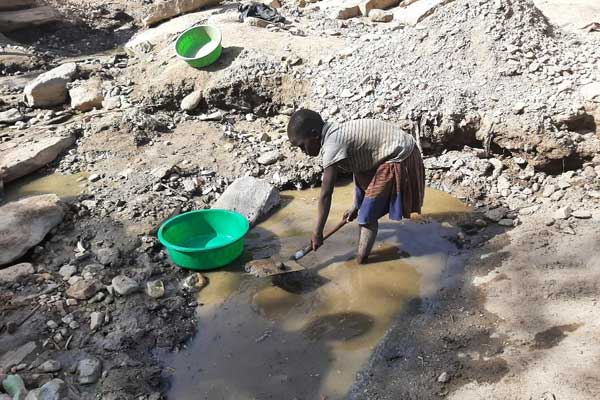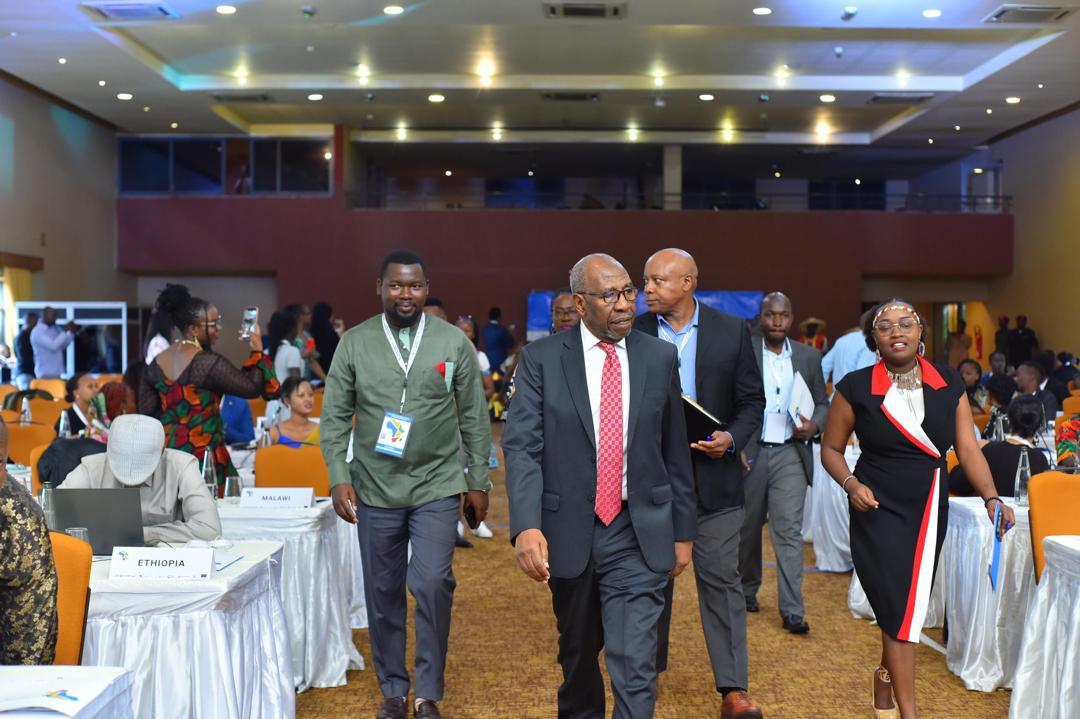Prime
Children resort to hard labour to survive, says Covid report

A girl collects sand in search of gold at Nakabat site in Rupa Sub Country, Moroto District. A report by Human Rights Watch shows a rise in exploitative and dangerous practices against children working to support their families PHOTO | ANTHONY WESAKA
What you need to know:
- The report dubbed: “I Must Work to Eat: Covid-19, Poverty, and Child labour in Ghana, Nepal, and Uganda” was co-published by Human Rights Watch, Initiative for Social and Economic Rights (ISER) in Uganda, and Friends of the Nation in Ghana.
It is a sunny mid-morning in Njeru Township in Buikwe District and 13-year old Latifa Nalujja, looks hungry and bored.
She has been at the trading center trying to sell a basin of silver fish (mukene), to raise income for her family.
“I started working because we were so badly off,” Nalujja says, the hunger evident in her voice.
“The hunger at home was too much for us to sit and wait,” she said at the height of the lockdown in August last year, that was instituted to curb the spread of Covid-19.
Her situation is captured in a report by Human Rights Watch, released Wednesday, that shows a rise in exploitative and dangerous practices against children working to support their families.
The report dubbed: “I Must Work to Eat: Covid-19, Poverty, and Child labour in Ghana, Nepal, and Uganda” was co-published by Human Rights Watch, Initiative for Social and Economic Rights (ISER) in Uganda, and Friends of the Nation in Ghana.
The study examines the rise in child labour and poverty during the Covid-19 pandemic, and the pandemic’s impact on children’s rights.
The report is based on interviews with 81 working children, some as young as eight, in Ghana, Nepal, and Uganda.
Issue
In all of these countries, parents were unable to fend for their families after their workplaces were shut down, to prevent the spread of the Covid-19 pandemic.
With schools also closed, it was left to children to support their families.
In Uganda, ISER interviewed 32 children ages 9 to 16 who worked at gold mines, stone quarries, fisheries, in agriculture, in construction, and selling items on the street.
Ms Angella Nabwowe Kasule, the programmes director at Initiative for Social and Economic Rights, who was one of the researchers involved in the study, told Daily Monitor in an interview yesterday that her office carried out studies in Karamoja, Buikwe, and Kampala.
The report found that many children there encountered very dire circumstances and were exposed to long, grueling work hours for little or no pay.
“Many of these children were being forced to work long and difficult hours, in order to survive. They were made to carry heavy loads in some cases, and punished for being too slow,” Ms Kasule says.
She adds that some of the children even reported violence, harassment, and pay theft.
“The children told us that they were denied food to eat, and were sometimes denied pay if they were found to have crushed the wrong kind of stones, yet these were still bought by clients,” she says.
Ms Kasule says the children interviewed in Uganda ranged from those crushing stones with their bare hands in Kampala and Napak (in Karamoja), to those who were made to sell silver fish (mukene) in Buikwe, to enable their families survive.
Asked about this, Ms Jo Becker, a children’s rights advocacy director at Human Rights Watch in New York, says the situation in Uganda mirrors their findings in Ghana and Nepal, where many were exposed to degrading and dangerous work conditions.
“It is important for countries to be very active in getting children back in schools and providing a meal,” she says.
Adding: “Countries like Mali and Kenya have taken the lead to help struggling families.
We have seen that support as little as $50 dollars per family make a difference in the condition of the children.”
Becker adds that countries must set up certain measures to prevent worse situations in the future.
Ms Kasule explains that failing to support these struggling families will be a major contributor to poverty in these countries, should another wave of Covid-19 infections come along in the nearby future.
Ms Kasule adds the countries involved in the study are not the wealthiest in the world, however, during the lockdown, when everyone was nervous about Covid-19, they worked to support struggling families.
“We are not asking for huge sums of money but the government should commit at least 0.4 per cent of the GDP to relieving struggling families, with at least a meal,” she said.
Becker is particularly concerned that unless the governments rise up to these challenges, a third wave of Covid-19 infections could permanently put millions of children worldwide into the labour force, reversing two decades of work by global civil society organisations to combat the practice and potentially marking the first rise in child labour since 2000.
The report comes at the time when health experts have warned of a possible second lockdown following a sharp rise in the infections .
Covid-19
Measures
Uganda has been globally commended for implementing one of Africa’s strictest lockdowns to curb the coronavirus and has kept infections relatively low at under 1,000 cases, with no deaths.
The government has since loosened some of these, but restrictions to many remain.
In several of his addresses to the nation, President Museveni acknowledged the troubles that many, including the children were going through.
The president pledged to provide all households with some food and a radio, so children could follow school lessons.
In many families these services are yet to reach.




